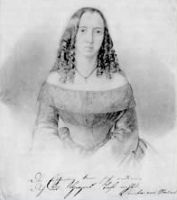Amalie Struve
Quotation
"Without enthusiasm nothing great and no good things happened on earth ... The ones held for enthusiasts, have done the most useful services to the human race. In spite of all the mockery, despite the persecution and contempt they persevered and even when they did not reach their goals, they made steps forward and brought things further. "
[J. G. Herder, 1744-1802, German writer, interpreter, theologian]
Why did I choose this woman?
I think Amalie Struve was a remarkable woman because she was politically and socially engaged and this exceptionally for her time and in spite of all the prejudices due to her origin as an illegitimate child.
She did this with great naturalness in 1848/49 during the "Badischen Revolution" on the side of her husband, and later in exile in America. She fought lifelong for the right of women to education and participation in decision-making processes.
Although Amalie Struve conducted many independent actions and has made her way as an independent writer and journalist, her effectiveness cannot be separated from that of her husband, as the couple pursued the most important policy objectives together.
Biography
Amalie Siegrist was born in 1824 out of wedlock in Mannheim (formerly Baden). She was, probably due to the supportive influence of her future stepfather who gave her his name Dusar (probably of Huguenot descent), a well-educated woman for her time. Like her stepfather, who was a French teacher, she occasionally worked as a language teacher. Unlike her female fellow activists in the struggle for freedom and justice, she did not carry out the usual typical female supporting services such as collecting donations and organizing charity events in the women's clubs that were just created. In her marriage to the lawyer, journalist and editor Gustav von Struve, Amalie Struve took on from the beginning an equal position. The couple lived from 1845 in a house at square E 6.2 in the immediate vicinity of the Catholic Civil Hospital of Mannheim, to which printing and publishing company was connected.
They printed there under Struve's editorial management the oppositional "Mannheim Journal" that gave him a platform for his revolutionary, anti-monarchist and radical democratic thoughts about the abolition of censorship and other liberal changes. Struve, as well as the "Mannheim Journal" in 1846, were known far beyond the city borders, when Gustav von Struve, despite the ban and fine from government censorship did not respond.
Because of his marriage to a commoner and being a staunch democrat, Gustav von Struve who came from Baltic aristocracy gave up in 1847 his aristocratic title.
Amalie agitated during the period of „pre-March“ at her husband's side , handing out flyers, even accompanied him during the so-called "Hecker march" in the military battles. After the "Heckerzug" was smashed in Kandern, Struve and other revolutionary colleagues tried in September 1848 in Lörrach to proclaim the Republic again. In separate processes Struve and Amalie were sentenced to prison. Amalie Struve spent 205 days in solitary confinement.
Barely released from her long imprisonment, Amalie came through her incitement of the military garnison in Rastatt (May 1849), again in conflict with the law. However, she was successful in liberating her husband from prison. On 1 June 1849 the Grand Duke of Baden, Prince Leopold was expelled and a Baden republic proclaimed under the provisional government of the left-liberal politician Lorenz Brentano. His hesitancy in the face of the advancing German troops led Struve and his followers to overthrow him after a short time. However, they were unable to fend off the superior Prussian troops. On 23 July 1849 in Rastatt the Revolution was put down and definitely failed.
Struve and Hecker were able to escape an execution and bring themselves to Switzerland to safety. After a stay in England the Struve-family emigrated to the USA in the spring of 1851, where already many of the „Forty-Eightiers" were. Struve attempted to secure income for the family as a journalist. Like in Europe, Amalie Struve continued fighting for the rights of women, her special concern was girls' education. As a resolutely militant democrat, she wrote socially critical articles and also novels and plays that deal with the ideal of freedom for all - especially for women. Unfortunately, these activities did not meet with sufficient financial success. The now increased family lived in very modest circumstances. The turning point came with the beginning of the Civil War, when Struve committed himself to serve for two years in the 8th New York Regiment as a lieutenant. Since he was soon promoted to captain, the family were financially better off.
After the birth of her third child Amalie Struve died in February 1862 in New York. Gustav Struve, who had resigned following a protest action against his new commander, embarked with the children to Europe. he settled first in Stuttgart and then in Coburg and died in August 1870 in Vienna.
Author: Eleonore Zorn
Bibliography
Amalie Struve: Erinnerungen aus den badischen Freiheitskämpfen. Den deutschen Frauen gewidmet, Hoffmann und Campe, Hamburg, 1850.
Sources
- Prof. Friedrich Walter: Mannheim in Vergangenheit und Gegenwart. Vom Übergang an Baden bis zur Gründung des Reiches. Band II, Verlag der Stadtgemeinde 1907.
- Kunze, Michael: Der Freiheit eine Gasse, München Kindler 1990.
Links
- Amalie Struve – Wikipedia
- https://www.mannheim.de/sites/default/files/page/2867/062_kath_spital_endf_060503.pdf
Source photo
- Stadtarchiv Mannheim – ISG, Bildsammlung AB01612, Urheber: NN, License: PD, Genehmigung: PD-old, Quelle: http://www.mannheim.de/io2/sendArticle.doB?currPath=%2FWebseiten%2FStadtgeschichte%2FStadtpunkte%2Fbuergertum%2Fbuegerhos%2Findex_de.xdoc, http://commons.wikimedia.org/wiki/File:Amalie_Struve.jpg?uselang=de
Source quote




